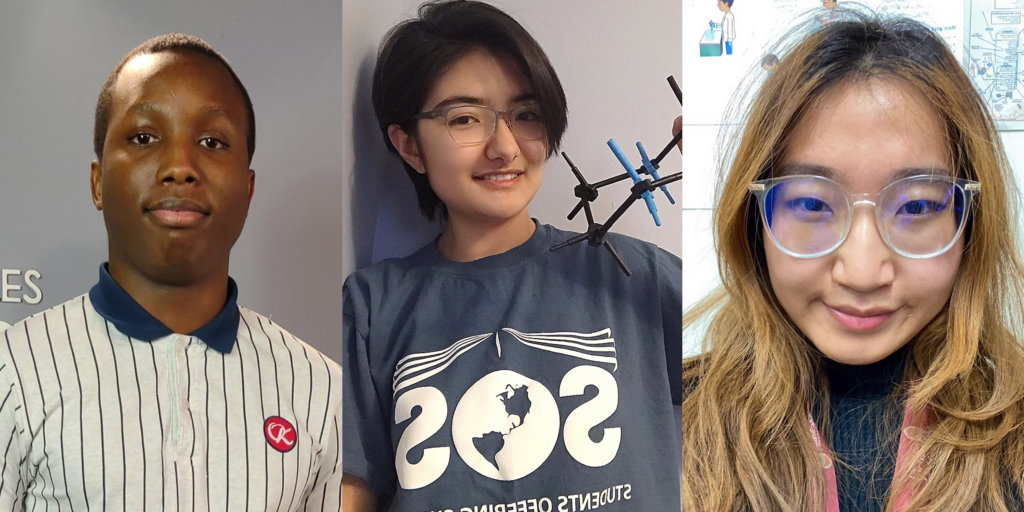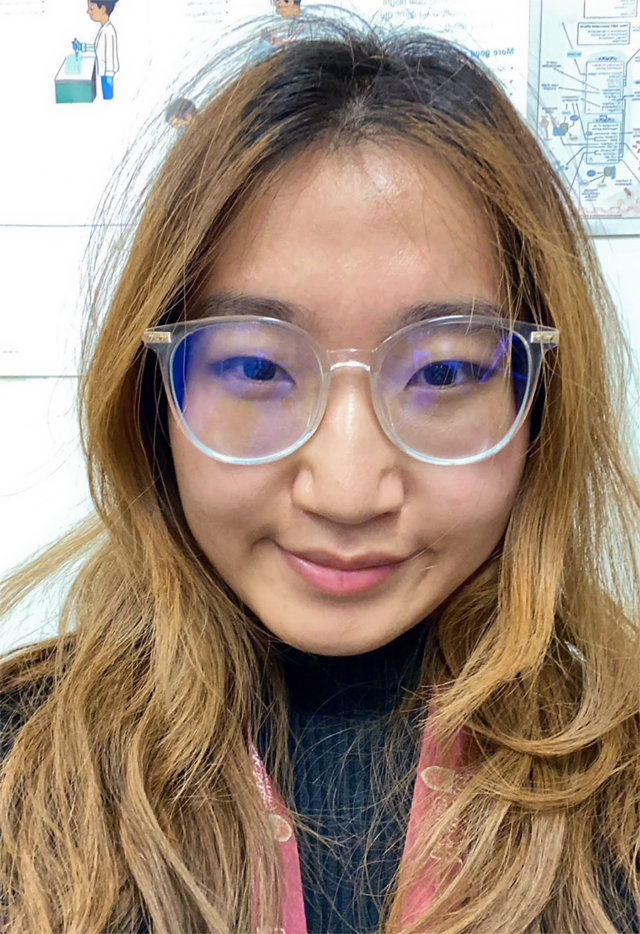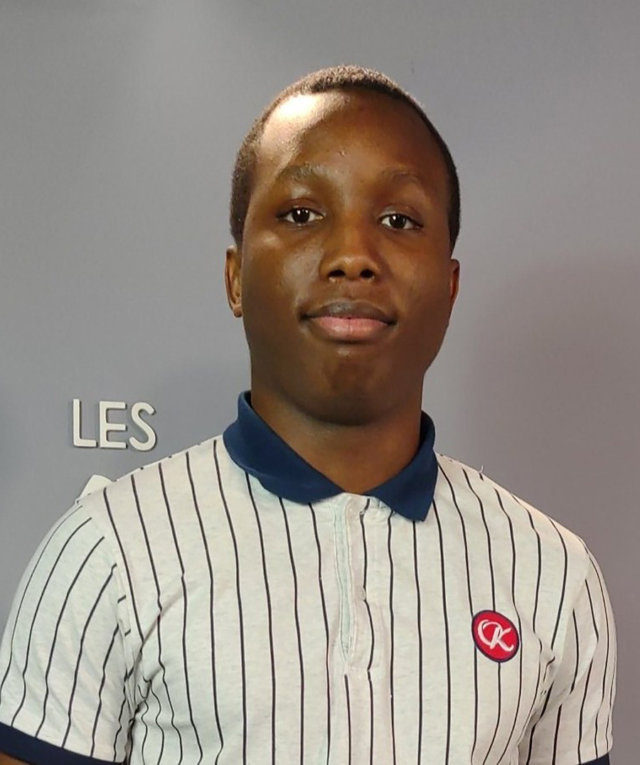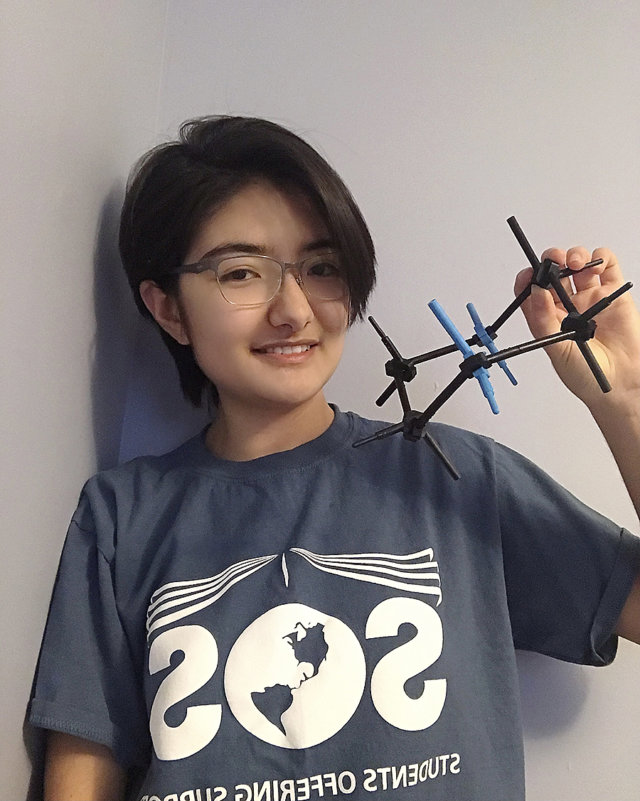
Q’n’A with our 2021 Studentship Recipients
Brain Tumour Foundation of Canada reached out to our three research studentship award recipients to learn more about them, their goals, and their aspirations.
Our focus for the studentships this year is pediatric brain tumours and glioblastoma. While 5+ year survival rates are highest among our youngest age groups (see Brain Tumour Registry of Canada’s most recent report), brain tumours are the number one cause of solid cancer death in children. Glioblastoma is the most common malignant brain tumour in adults. Changing those statistics won’t happen overnight, but by supporting the young researchers of today, we are actively investing in the breakthroughs of tomorrow.
Each of our recipients possess the drive and the inquisitiveness to make their mark in the world of cancer research, and improve the lives of the thousands of Canadians that will be diagnosed with a brain tumour each year.
Congratulations to Yujin, Leonas and Dini, and all the best in your research.
YUJIN SUK
 How did you decide to pursue brain tumour research?
How did you decide to pursue brain tumour research?
Early on in my childhood I lost both of my grandfathers to prostate and stomach cancer respectively.
While it was an extremely painful experience to go through at the time, I was also able to recognize and be grateful for the time I was able to spend with them growing up. As a result, I initially associated cancer with old age and harmful environmental factors (such as smoking) that can contribute to tumourigenesis over long periods of exposure.
During my undergraduate studies I learned that there were exceptions to this rule and one such exception was brain tumours which is the most common solid, malignant cancer diagnosed in the pediatric population.
For my PhD project I extended my passion towards novel cancer therapeutics into a field that presents additional challenges compared to their adult counterparts, where oftentimes the tumours lack heavy mutational burden and exist in a more vulnerable, developing brain, which calls for more personalized and safe forms of anticancer therapies.
How did you connect with Brain Tumour Foundation of Canada?
Brain Tumour Foundation of Canada is an organization that supports brain tumour research from both principal investigators already established in their fields and students who are just starting off their research careers. In my laboratory we had multiple BTFC recipients over the last couple years that have led amazing projects and I am honoured to be a part of the list of students granted the studentship award.
Have you personally met any brain tumour patients? If so, what did you learn from them? Has it changed your approach to work?
As an MD/PhD student completing both my medical and doctoral training conjointly, I have had the opportunity to meet and interact with patients from their initial diagnosis appointment in the clinic to their surgeries shadowing neurosurgeons and medical staff in the operating rooms. Our laboratory also hosts patients and patient advocates that relate their own individual experience being diagnosed and surviving brain tumours through presentations and seminars.
These patient experiences and stories directly impact the motivation for our research and allows us to maintain a holistic insight throughout our work so that we can address scientific and therapeutic concerns raised from patients themselves.
This is directly exemplified by our mice models used to test our polytherapies as they are put through the exact same treatment course a patient faces including chemoradiation, minimal residual disease, and recurrence.
What inspires you?
I take inspiration from experiences both personal and professional in nature, including patient encounters and advocacy, working alongside and learning from talented colleagues and collaborators, improving my skills and techniques as I try novel and innovative approaches in my project, and from friends and family that continue to support my goals and aspirations when I face inevitable obstacles and failures through my MD/PhD career.
If you have experience with Research, what is your biggest research accomplishment?
My biggest research accomplishment was during my undergraduate studies, I volunteered in the laboratory of Dr. Ryan Russell and contributed to a project mapping the autophagy signalling pathway in response to bacterial infection.
I was fortunate to find a very active and determined mentor early on in my studies that inspired my passion for scientific research and in a similar manner I am able to pursue my PhD project in my current placement in the laboratory of Dr. Sheila Singh with extensive support from mentors and peers in a collaborative team-based research environment.
If you could have one research question answered, what would it be?
If I could have one research question answered, it would be “What are the molecular pathways that drive Group 3 MB recurrence/metastases making it more aggressive in contrast to the other subtypes of medulloblastoma?”
LEONAS TATCHINDA
 How did you decide to pursue brain tumour research?
How did you decide to pursue brain tumour research?
My interest in this research and in tumours in general comes from a personal experience. Five years ago, my mother was diagnosed with a stage four breast cancer. Since then, I have been curious to know more about tumours and I aspire to be part of physicians working hard to increase the health of the population affected by tumours.
The opportunity to be involved in brain tumour research was therefore a great start for me to acquire knowledge and experience in this medical field.
How did you connect with Brain Tumour Foundation of Canada?
After being accepted to participate as a summer research stagiaire in the research department of psycho-oncology pediatric at CHU Sainte-Justine, my supervisor, Dr. Leandra Desjardins, presented me the opportunity to obtain a studentship award delivered by Brain Tumour Foundation of Canada, which funds such important research on brain tumours. That is how I made the connection.
Have you personally met any brain tumour patients? If so, what did you learn from them? Has it changed your approach to work?
Not yet. However, I participated in a clinical study aiming to use hypnosis to reduce pain felt by patients in pediatric oncology during painful procedures. Prior to participation, I watched a recent video of a brain tumour patient participating in the clinical study. Even though I did not meet the patient in person, the interaction he had with the nurse triggered in me a sense of joy because I could see a collaboration between the professional and the patient.
I realized that the goal or approach is not to work for the patients, but to work with the patients.
What inspires you?
My family and I have benefitted a lot from the advances of the science of tumours. Moving here to Canada and having access to adequate healthcare is maybe what saved my mother’s life. However, when I look from where I come from, Cameroun, many people are not yet receiving good quality healthcare.
There is a proverb which says: “If you know where you come from, you will know where you are going to”. I come from a country in development as many other countries where good quality healthcare is not accessible to everyone. After being a witness here in Canada of the level of healthcare provided to the population, I just have one main goal: being part of those people who give back what they have received.
In my case, contributing to the development of the healthcare system in Africa is what inspires and motivates me every day.
If you have experience with Research, what is your biggest research accomplishment?
I had only one research experience which was in Cegep. I participated in a research project which aimed to determine the effects of mutations on mNeonGreen protein (fluorescent gene) to make it efficient (brighter). In this research, my biggest accomplishment was the development of research skills. It was a first step for me in the field of research.
If you could have one research question answered, what would it be?
What are the psychosocial effects of palliative care on bereaved family members?
DINA DILINAER
 How did you decide to pursue brain tumour research?
How did you decide to pursue brain tumour research?
Since many lives are affected by cancer and various types of tumours, it has always been my interest to pursue cancer-related research. As the most delicate and complicated organ in the human body, the brain plays a crucial role in our daily life. The brain’s complexity as an organ amazes me and hence, I’m intrigued by how brain tumours affect brain health and finding cures for brain tumours.
How did you connect with Brain Tumour Foundation of Canada?
I work in the Trant Lab at the University of Windsor under the supervision of Dr. John F. Trant. Our lab has received a Brain Tumour Foundation of Canada feature grant for 2020, so I got to know more about the organization through that, and Dr. Trant also forwarded me with the application for the studentship.
Have you personally met any brain tumour patients? If so, what did you learn from them? Has it changed your approach to work?
I have not met any brain tumour patients personally, but I have met patients with other types of cancer and I hope that there will come a day where cancers no longer exist in our world.
What inspires you?
My parents have been a constant source of inspiration for me. They motivate me to become a better person and do better things with my future. Other than that, scientific breakthroughs, accomplishments in the field of organic chemistry, applications of fundamental research to improve human health (such as drug synthesis) and learning about great organic chemists also inspire me. To think that we live under the same sky and maybe one day I will be able to contribute to this world like they’ve done excites me.
If you have experience with research, what is your biggest research accomplishment?
I have experiences with research, and I have worked on a variety of projects. For me, my biggest accomplishment is that research made me into the person that I am today. If it wasn’t for research, I wouldn’t have discovered my passion, acquired techniques and problem solving in a lab, and learned so much knowledge about organic chemistry.
Research has made me a better scientist than what I can imagine myself to be. In terms of projects, my biggest accomplishment is that I’m co-authoring a book chapter for a self-immolative polymer handbook that my lab is publishing.
If you could have one research question answered, what would it be?
I would like to know about the role that solvents play in certain organic reactions, or known as solvent effects. For example, in halogen dance rearrangements, it was found that THF (tetrahydrofuran) promotes halogen dancing while THP (tetrahydropyran) relatively inhibits it. This is interesting because the aforementioned solvents are very similar in structure and they only differ by one methylene (-CH2-) group. Solvents are a crucial part of organic reactions since most reactions are carried out in solvents, but they are often overlooked or not thoroughly understood.